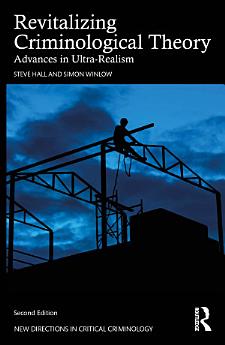Revitalizing Criminological Theory: Advances in Ultra-Realism, Edition 2
About this ebook
In the first edition, Hall and Winlow introduced a number of important new concepts that laid the foundations for an alternative theoretical framework and research programme in criminology. In three additional chapters written specially for this edition, they introduce further concepts and substantive revisions to the theoretical framework. They also outline and discuss in detail the growing body of award-winning criminological projects conducted by a new generation of researchers who have adopted and mobilised ultra-realist thinking over the past ten years. During this period of time, ultra-realism has also made significant progress towards its primary objectives of understanding human motivations, constructing insightful representations of reality and answering the fundamental zemiological question of why some human beings risk inflicting harm on others to further their own interests or achieve various ends. The philosophical and psychosocial approaches outlined in the first edition are now significantly advanced and able to offer a more detailed answer to this question and a convincing alternative to the traditional paradigms of conservatism, neoclassicism and left liberalism. Ultra-realism is now in a position to make some substantive contributions to the debate on the depth of political intervention required to get serious about reducing the impact of crime and harm on the lives of ordinary people.
This book is essential reading for academics and students engaged in the study of criminology, sociology, social psychology, the philosophy of social science and the history of crime.
About the author
Steve Hall is Emeritus Professor of Criminology at Teesside University. Often described as a polymath, he has published in the fields of criminology, sociology, politics, cultural theory, philosophy, history and anthropology. He is author of numerous articles and book chapters. He is co-author of Criminal Identities and Consumer Culture (Routledge/Willan, 2008) and Riots and Political Protest (Routledge, 2015). He is co-editor of New Directions in Criminological Theory (Routledge, 2012).
Simon Winlow is Professor of Social Science at Northumbria University. An interdisciplinary scholar, he is the author or co-author of Criminal Identities and Consumer Culture (Routledge/Willam, 2008) and Riots and Political Protest (Routledge, 2015). He is also the co-editor of New Directions in Criminological Theory (Routledge, 2012) and New Directions in Crime and Deviancy (Routledge, 2012).







